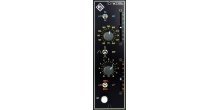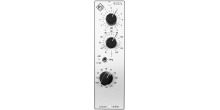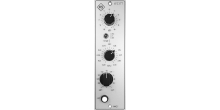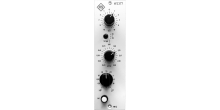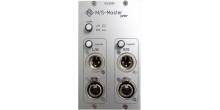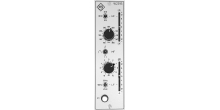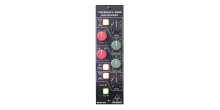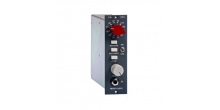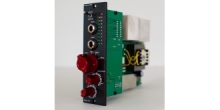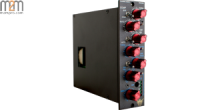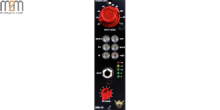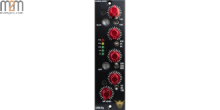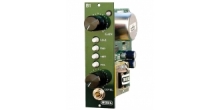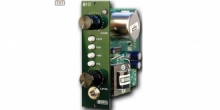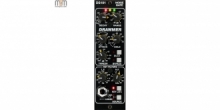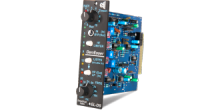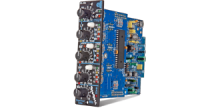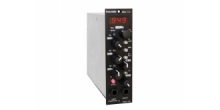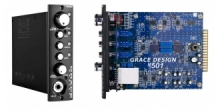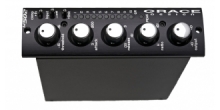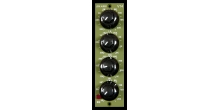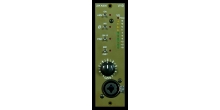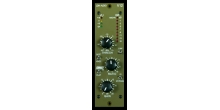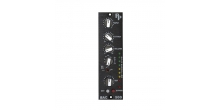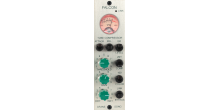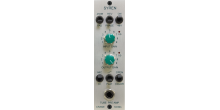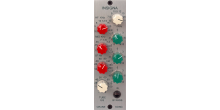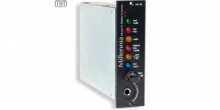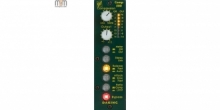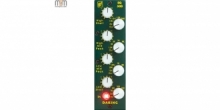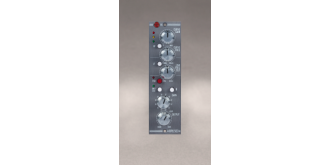 Agrandir l'image
Agrandir l'image
| Gain at 1kHz: | 81dB of gain at 1kHz, balanced-in to balanced-out in Microphone Input Mode |
| Noise figure, rms A-weighted: | < 2dB |
| Noise figure, rms unweighted: | < 3dB, 20 kHz LPF bandwidth |
| EIN: | < -130 dBu A-weighted, 150 Ohm resistive source |
| Frequency response: | -3dB < 1Hz and > 100 kHz |
| THD: | < 0.02% at 1 kHz |
| Input impedance: | 10K Ohms |
| Balanced Line Input Impedance: | 20K Ohms |
| Input Gain control: | Twelve-position switch provides from +13dB to +62dB of gain for the preamplifier circuit, as measured between the input and the before the output line driver. |
| Switched LF Shelving filter: | -3dB break-frequency tunable from 18 Hz to 360 Hz; maximum reduction -20dB. |
| Switched CurveShape EQ: | +3dB break-frequency tunable from 2.5 kHz to 30 kHz; HF gain adjustable from +0 dB to +18 dB; the slope of the HF filter varies interactively and directly with the CurveShaper™ frequency and gain settings |
| Color LEDs: | Green, Yellow, Red |
| XLR output maximum level into 600Ω load: | +28 dBu, balanced; 0 dBu = 0.7746 V rms |
| XLR connectors polarity: | Pin-1 is ground, pin-2 is high, pin-3 is low |
| LED signal level indicators: | The green LED snaps on at -20 dBu to indicate the presence of signal; the yellow LED snaps on at 0 dBu; the red LED snaps on at +24 dBu to warn of approaching signal overload |
| External Features: | Laser engraved front panel markings Grayhill series 71 stepped gain switch Internal Operating Voltage: Bipolar 17V |
| Dimensions: | |
| Size: | 1.5” w, 6.8” d, 4.5” h (3.8cm x 17.27cm x 11.43cm) |
| Weight: | 11.7oz (~0.33 kg) |
AEARPQ606C
Nouveau
AEA -RPQ500

- One channel with 81dB of sweet and quiet JFET gain for all mics
- High frequency CurveShaper™ EQ and low frequency proximity control
- Mic and line inputs for mixdown EQ versatility
- Switchable phantom power, polarity, line/mic, and EQ inserts
- NoLoad™ 10k Ohm high-impedance circuitry providing better overall transients, frequency response, and higher output sensitivity
The Versatile Mic Pre in the 500 series format
The RPQ500 module, designed after the successful RPQ preamp, provides the same ultra-clean, high-gain signal path that has earned AEA preamps their great reputation, but in a 500 series package. JFET circuit topology provides all the dynamics, subwoofer bass, and fast transients that your microphones can record. The NoLoad™ input impedance above 10K Ohms means the RPQ won’t load down a mic and change its sound. Low Energy Storage™ circuit design instantly recovers from overloads for superior dynamic performance. The original RPQ with CurveShaper™ was designed to fully capture every nuance of ribbon microphones: vintage or modern, passive or phantom powered. Engineers have discovered that the RPQ500 also complements their moving coil, condenser mics. By virtue of its sonic qualities and versatility, the VPR Alliance approved AEA RPQ500 is the tool of choice for all microphones whenever a true and pristine signal path is desired.
Two Peas in a Pod: Musical Preamp, Sweet EQ
The CurveShaper’s™ high-frequency filter boost enables you to add a little extra “presence” or “air” to your source. The circuit functions similarly to a conventional parametric shelving boost, but with a significant difference: the slope varies as both the CurveShaper™ and HF Gain controls are adjusted. This unique bell curve was designed with the intention to compensate for the high-frequency roll-off that is inherent to most ribbon microphones. But beyond ribbon mics, the smooth HF filter is remarkably well suited for brightening up condenser mics used at a distance, restore presence in overly “dry” acoustical environments, or even as a clean and transparent air-band boost on the 2-bus. The CurveShaper’s™ low-frequency control easily removes boxiness and boominess in a fast and unobtrusive way. Ribbon mics are capable of delivering strong subwoofer lows, and can have a significant bass proximity effect. Such strong low-frequency content can mask high-frequency intelligibility, so the tunable LF filter was engineered to tame low-frequency energy to appropriate levels. Its -20dB shelving curve is ideally suited to reduce excessive proximity effect, opening up new possibilities to use ribbon mics in close-up applications.
Your Sound At Your Fingertips
With mixing consoles disappearing from control rooms, dedicated preamps can take on the role of providing a high-quality front end giving you intuitive control to make critical decisions during tracking rather than “fixing it in the mix”. The RPQ500 is a workhorse tool for your API 500 compatible rack. The Line/Mic switch bypasses the microphone gain stage and allows the EQ to be used for tracking with other preamps or during mixdown. Add the output level control, and the RPQ500 becomes a high-quality processing tool that can be used for mixing and mastering when combined with summing racks and mixers such as the Purple Audio Moiyn or the Roll Music Folcrom.
Features And Specs
| Gain at 1kHz: | 81dB of gain at 1kHz, balanced-in to balanced-out in Microphone Input Mode |
| Noise figure, rms A-weighted: | < 2dB |
| Noise figure, rms unweighted: | < 3dB, 20 kHz LPF bandwidth |
| EIN: | < -130 dBu A-weighted, 150 Ohm resistive source |
| Frequency response: | -3dB < 1Hz and > 100 kHz |
| THD: | < 0.02% at 1 kHz |
| Input impedance: | 10K Ohms |
| Balanced Line Input Impedance: | 20K Ohms |
| Input Gain control: | Twelve-position switch provides from +13dB to +62dB of gain for the preamplifier circuit, as measured between the input and the before the output line driver. |
| Switched LF Shelving filter: | -3dB break-frequency tunable from 18 Hz to 360 Hz; maximum reduction -20dB. |
| Switched CurveShape EQ: | +3dB break-frequency tunable from 2.5 kHz to 30 kHz; HF gain adjustable from +0 dB to +18 dB; the slope of the HF filter varies interactively and directly with the CurveShaper™ frequency and gain settings |
| Color LEDs: | Green, Yellow, Red |
| XLR output maximum level into 600Ω load: | +28 dBu, balanced; 0 dBu = 0.7746 V rms |
| XLR connectors polarity: | Pin-1 is ground, pin-2 is high, pin-3 is low |
| LED signal level indicators: | The green LED snaps on at -20 dBu to indicate the presence of signal; the yellow LED snaps on at 0 dBu; the red LED snaps on at +24 dBu to warn of approaching signal overload |
| External Features: | Laser engraved front panel markings Grayhill series 71 stepped gain switch Internal Operating Voltage: Bipolar 17V |
| Dimensions: | |
| Size: | 1.5” w, 6.8” d, 4.5” h (3.8cm x 17.27cm x 11.43cm) |
| Weight: | 11.7oz (~0.33 kg) |
| Type de matériel | Préamplis |




